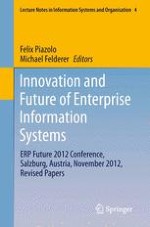2013 | OriginalPaper | Buchkapitel
Enterprise Resource Planning Requirements Process: The Need for Semantic Verification
verfasst von : Peter Bollen
Erschienen in: Innovation and Future of Enterprise Information Systems
Verlag: Springer Berlin Heidelberg
Aktivieren Sie unsere intelligente Suche, um passende Fachinhalte oder Patente zu finden.
Wählen Sie Textabschnitte aus um mit Künstlicher Intelligenz passenden Patente zu finden. powered by
Markieren Sie Textabschnitte, um KI-gestützt weitere passende Inhalte zu finden. powered by
